Fleurs du Mal Magazine


Or see the index
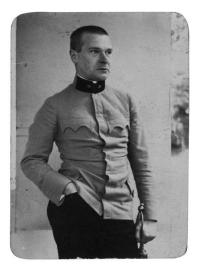
Nähe des Todes
O der Abend, der in die finsteren Dörfer der Kindheit geht.
Der Weiher unter den Weiden
Füllt sich mit den verpesteten Seufzern der Schwermut.
O der Wald, der leise die braunen Augen senkt,
Da aus des Einsamen knöchernen Händen
Der Purpur seiner verzückten Tage hinsinkt.
O die Nähe des Todes. Laß uns beten.
Jn dieser Nacht lösen auf lauen Kissen
Vergilbt von Weihrauch sich der Liebenden schmächtige Glieder.
Georg Trakl
(1887 – 1914)
Nähe des Todes
• fleursdumal.nl magazine
More in: - Archive Tombeau de la jeunesse, Archive S-T, Trakl, Georg, Trakl, Georg, WAR & PEACE
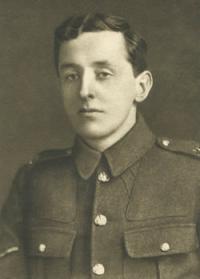
Comrades
Those whom I’ve known, admired, ardently friended
Lie silent there wrapp’d in a soldier’s shroud;
Death broke their dreams, their aspirations ended,
These sanguine youth, noble, brave and proud.
Slowly they bear them ‘neath the dim star light
Unto their rest – the soldiers’ cemetery:
The chaplain chants a low, brief litany;
The nightingale flings rapture on the night.
Back to their Mother Earth this night return
Unnumbered youth along the far-flung line;
But ’tis for these my eyes with feeling burn,
That Memory doth erect a fadeless shrine –
For these I’ve known, admired, ardently friended
Stood by when Death their love, their youth swift ended.
John William (Will) Streets
(1886 –1916)
Comrades
• fleursdumal.nl magazine
More in: - Archive Tombeau de la jeunesse, Archive S-T, Streets, Will, WAR & PEACE

Nacht im Schützengraben
Tief will sich der Himmel neigen,
Schwer von seiner Sternenlast.
Runde Leuchtraketen steigen
Auf zu seinem Blaudamast.
Rückwärts ist mein Kopf geglitten
Auf den Sand der Schulterwehr
Und mir ist, als wär ich mitten
In dem weißen Silbermeer.
Schüsse fallen, Rufe kommen,
Meine Hand kühlt kühlen Wind,
Und ich weiß kaum, traumbenommen,
Noch, was Stern, was Augen sind.
Gerhard Moerner
(1894-1917)
Aus: „Aus dem Felde“. Gedichte.
Kugelverlag, Hamburg 1917.
• fleursdumal.nl magazine
More in: *War Poetry Archive, - Archive Tombeau de la jeunesse, Archive M-N, WAR & PEACE
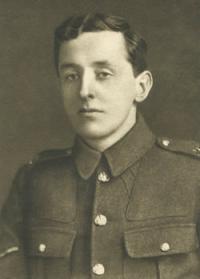
Shelley in the Trenches 2nd May 1916
Impressions are like winds; you feel their cool
Swift kiss upon the brow, yet know not where
They sprang to birth: so like a pool
Rippled by winds from out their forest lair
My soul was stir’d to life; its twilight fled;
There passed across its solitude a dream
That wing’d with supreme ecstasy did seem;
That gave the kiss of life to long-lost dead.
A lark trill’d in the blue: and suddenly
Upon the wings of his immortal ode
My soul rushed singing to the ether sky
And found in visions, dreams, its real abode –
I fled with Shelly, with the lark afar,
Unto the realms where the eternal are.
John William (Will) Streets
(1886 –1916)
Shelley in the Trenches 2nd May 1916
• fleursdumal.nl magazine
More in: - Archive Tombeau de la jeunesse, Archive S-T, Shelley, Percy Byssche, Streets, Will, WAR & PEACE

Sibylla Schwarz
Alß sie ein Poëtischer Geist tribe
Ich, der ich sonsten pflag von schlechten Dingen schreiben,
bin gänzlich umgekehrt, nun muß mein Lob wohl bleiben,
und grünen wie ein Zweig, iezt wil ich meinen Sinn,
von dem, das niedrig ist, biß in die Wolcken ziehn.
Die Göttin Fama wil mir selber Flügel geben,
die immer für und für am helle n Himmel kleben,
und wo der Venus Sohn hinfüro schiessen wil
nach mir, so raht ich, daß er in die Wolcken Ziel.
Da soll mein Ball=Plaz seyn, da soll das Glüder fliegen,
wie Spreu das brennen muß, und allzeit unten ligen.
Die Clio bindet mir schon selbst die Lohrbeer=Kron,
die Ewig grünen wird / nun soll die Kunst den Lohn
erlangen, recht; So muß ein freyer Sinn bekleiben;
nuhn, ich will immer auch bey meinen Worten bleiben,
und steigen mit dem Sinn des Himmels Leiter an,
ein jeder sey bereit, daß er mir folgen kan.
Sibylla Schwarz (1621 – 1638)
Gedicht: Alß sie ein Poëtischer Geist tribe
fleursdumal.nl magazine
More in: - Archive Tombeau de la jeunesse, Archive S-T, SIbylla Schwarz
Het eeuwenoude gebied De Heilige Driehoek in het Noord-Brabantse Oosterhout vormt tijdens de 1e Biënnale Kunst in de Heilige Driehoek het decor voor hedendaagse kunst, met – in deze eerste editie – liefde als thema.

Op uitnodiging van curator Guus van den Hout tonen vijfentwintig hedendaagse kunstenaars, onder wie Reinoud van Vught, Sam Drukker, Carolein Smit en Aziz Bekkaoui, veelal nieuwe werken, geïnspireerd door de unieke locatie en de rijke historische, religieuze en spirituele tradities. De in totaal circa 150 kunstwerken variëren van schilderijen, fotografie, video, muziek en prenten tot mode, sculpturen en zelfs een geurinstallatie.
De 1e Biënnale Kunst in de Heilige Driehoek is de enige grootschalige hedendaagse kunstbiënnale in Europa die kunst en religie nadrukkelijk als uitgangspunt neemt.
Uniek kloostergebied als inspiratie én decor van hedendaagse kunst Het gebied De Heilige Driehoek – ruim 100 hectare groot – dankt zijn naam aan drie monumentale, eeuwenoude kloosters die zijn omgeven door grote kloostertuinen en landerijen: de Onze Lieve Vrouwe Abdij, De Sint-Paulusabdij en het Sint-Catharinadal. De Heilige Driehoek is de enige plek in Nederland waar nog een combinatie van drie actieve kloosters bestaat.
De Biënnale vindt plaats in de kloostergebouwen, de kloostertuinen en de kloosterkapellen, die voor het eerst worden geopend voor het grote publiek en voor hedendaagse kunst. De kunstenaars laten zich inspireren door het gebied zelf, de rijke historie en de artistiek-religieuze tradities. Veel werken zijn in opdracht van de Biënnale gemaakt en worden dan ook voor het eerst getoond. De Biënnale heeft de ambitie om de kunstzinnige tradities van de kloosters, die excelleerden in architectuur, schilderkunst, het restaureren van wandtapijten, handschriften en boeken, en kunstnijverheid, te verbinden met artistieke vernieuwing.
Deelnemende kunstenaars zijn: Aziz Bekkaoui, Caspar Berger, Krien Clevis, Sam Drukker, Huub en Adelheid Kortekaas, Judith Krebbekx, Elisa Pesapane, Ruudt Peters, René van Tol, Tijmen van Tol, Heidi Wallheimer, Erik Zwaga, Marieke Bolhuis, Patrizia Comand, Frans Franciscus, Robin Kolleman, Bernardien Sternheim, Hansa Versteeg, Moreno Bondi, dré didderiëns, Athar Jaber, Jago Moons, Spank Moons, Michael Petry, Carolein Smit en Reinoud van Vught.
# Meer informatie op website www.kunstindeheiligedriehoek.nl
1e Biënnale Kunst in de Heilige Driehoek – Liefde nog tot en met 22 oktober 2017 in Oosterhout
fleursdumal.nl magazine
More in: - Archive Tombeau de la jeunesse, Art & Literature News, Exhibition Archive, FDM Art Gallery, Performing arts, Photography, Sculpture
Ontdek het rebelse literaire Amsterdam van 1880, met theater, muziek, poëzie, film, eten, drinken en veel meer op 27 – 28 – 29 oktober 2017
 De locaties
De locaties
Festivalhart: Het Tropeninstituut
Mauritskade 63, Amsterdam
Kassa, theaterzaal en foyer zijn tijdens het festival gevestigd in het voormalige Tropentheater aan de zijkant van het gebouw, in de Linnaeusstraat. De boekverkoop van de Linnaeusboekhandel, de foyer (het Soeterijn Café) én de Poëziebar met absint en sonnetten vindt u in het Tropentheater.
Grote Zaal
Project Diepenbrock, op de zaterdagavond, vindt plaats in de spectaculaire Grote Zaal, te betreden via de hoofdingang aan de Mauritskade.
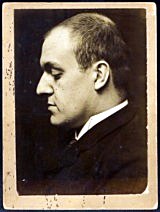 Grand Café de Tropen
Grand Café de Tropen
De Tachtigersconferentie en de Thee met Van Deyssel vinden plaats in de Subtropenzaal van Grand Café de Tropen. Het Grand Café is open voor drankjes, lunch en borrelhapjes, en is ‘s avonds de locatie voor het Van Deysseldiner.
Witsenhuis
Oosterpark 82, Amsterdam
Het Witsenhuis, waar fotograaf Willem Witsen woonde en regelmatig de Tachtigers over de vloer kreeg, heeft een verdieping in de oude staat gehouden. Wilt u ook bij de Tachtigers langskomen? Dat kan! Bij wijze van uitzondering opent het Witsenhuis zijn deuren voor rondleidingen.
Pianola Museum
Westerstraat 118, Amsterdam
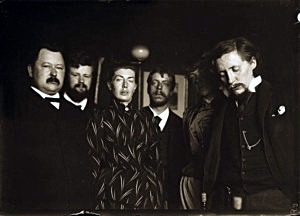 Het Geelvinck Pianola Museum bezit een grote hoeveelheid automatische piano’s (pianola’s), pianolarollen, automatische instrumenten en bijzondere grammofoons, alsook een kleine collectie schellakplaten. Op zondag 29 oktober vindt een bijzonder Koffieconcert rondom de Tachtigers plaats, met oude opnamen en pianolarollen van Nederlandse componisten uit hun tijd!
Het Geelvinck Pianola Museum bezit een grote hoeveelheid automatische piano’s (pianola’s), pianolarollen, automatische instrumenten en bijzondere grammofoons, alsook een kleine collectie schellakplaten. Op zondag 29 oktober vindt een bijzonder Koffieconcert rondom de Tachtigers plaats, met oude opnamen en pianolarollen van Nederlandse componisten uit hun tijd!
Bijzondere Collecties van de Universiteit van Amsterdam
Oude Turfmarkt 129, Amsterdam
 Tot de Bijzondere Collecties van de Universiteit van Amsterdam behoren rijke literaire verzamelingen en de Tachtigers zijn daarin ruim vertegenwoordigd. De collectie van het Frederik van Eeden-Genootschap wordt er beheerd en het archief van Albert Verwey is er eveneens te raadplegen. Verder zijn er stukken van onder anderen Willem Kloos en Jacques Perk, en archivalia van Flanor, de literaire vereniging waar veel Tachtigers in hun studententijd bij aangesloten waren. Een kleine tentoonstelling met manuscripten, foto’s, tekeningen en persoonlijke documenten van Tachtigers is gratis te zien in de hal tijdens het gehele festival, gedurende de openingstijden van de Bijzondere Collecties.
Tot de Bijzondere Collecties van de Universiteit van Amsterdam behoren rijke literaire verzamelingen en de Tachtigers zijn daarin ruim vertegenwoordigd. De collectie van het Frederik van Eeden-Genootschap wordt er beheerd en het archief van Albert Verwey is er eveneens te raadplegen. Verder zijn er stukken van onder anderen Willem Kloos en Jacques Perk, en archivalia van Flanor, de literaire vereniging waar veel Tachtigers in hun studententijd bij aangesloten waren. Een kleine tentoonstelling met manuscripten, foto’s, tekeningen en persoonlijke documenten van Tachtigers is gratis te zien in de hal tijdens het gehele festival, gedurende de openingstijden van de Bijzondere Collecties.
Rondleiding Concertgebouw en Alphons Diepenbrock
Concertgebouwplein 10, 1071 LN Amsterdam
 De componist onder de Tachtigers, die warme banden onderhield met vooral Herman Gorter, was Alphons Diepenbrock. Hij toonzette onder ander gedichten van Tachtigers Jacques Perk en Lodewijk van Deyssel, en staat vermeld op een cartouche in de Grote Zaal van het Concertgebouw, die tijdens de Tweede Gouden Eeuw van Amsterdam eind 19e eeuw werd gebouwd, en waar de Tachtigers regelmatig te vinden waren in de beginjaren. Een speciale, eenmalige rondleiding voor slechts 15 personen brengt u in verschillende ruimten van het Concertgebouw, die normaal niet toegankelijk zijn voor het publiek. Tevens wordt daarbij verteld over het Concertgebouw en zijn orkest in de tijd van de Tachtigers in het algemeen en Diepenbrocks betrokkenheid daarbij in het bijzonder.
De componist onder de Tachtigers, die warme banden onderhield met vooral Herman Gorter, was Alphons Diepenbrock. Hij toonzette onder ander gedichten van Tachtigers Jacques Perk en Lodewijk van Deyssel, en staat vermeld op een cartouche in de Grote Zaal van het Concertgebouw, die tijdens de Tweede Gouden Eeuw van Amsterdam eind 19e eeuw werd gebouwd, en waar de Tachtigers regelmatig te vinden waren in de beginjaren. Een speciale, eenmalige rondleiding voor slechts 15 personen brengt u in verschillende ruimten van het Concertgebouw, die normaal niet toegankelijk zijn voor het publiek. Tevens wordt daarbij verteld over het Concertgebouw en zijn orkest in de tijd van de Tachtigers in het algemeen en Diepenbrocks betrokkenheid daarbij in het bijzonder.
Stichting Feest der Poëzie organiseert bijzondere voorstellingen met gedichten en muziek op mooie plaatsen, en richt zich op vormvaste dichtkunst, klassieke voordrachtskunst en ambachtelijke boekdrukkunst.
Stichting Feest der Poëzie, een collectief van dichters, musici en een magiër, treedt op in binnen- en buitenland. Wegens het tienjarig bestaan van de stichting is ‘Het Festijn van Tachtig’ in het leven geroepen.
Dit seizoen organiseren zij naast het Festijn nog avonden in het Pianola Museum in Amsterdam, WORM in Rotterdam, Nieuwe Erven in Amersfoort en op andere plaatsen.
# Meer info website Feest der Poëzie
Feest der Poëzie organiseert ‘Het Festijn van Tachtig’
fleursdumal.nl magazine
More in: *Archive Les Poètes Maudits, - Archive Tombeau de la jeunesse, - Book Lovers, - Book Stories, Art & Literature News, CLASSIC POETRY, Feest der Poëzie, Gorter, Herman, Kloos, Willem, Literary Events, LITERARY MAGAZINES, Lodewijk van Deyssel, Museum of Literary Treasures, MUSIC, THEATRE
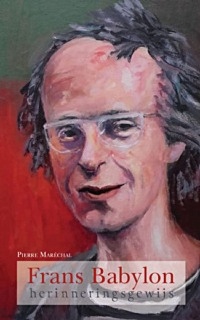 Volgens Pierre Maréchal was de Brabantse dichter Frans Babylon een zieke poète maudit die zowel de poëzie als de kunst stimuleerde te vernieuwen. Brabant liep sterk achter bij de ontwikkelingen.
Volgens Pierre Maréchal was de Brabantse dichter Frans Babylon een zieke poète maudit die zowel de poëzie als de kunst stimuleerde te vernieuwen. Brabant liep sterk achter bij de ontwikkelingen.
Uiteindelijk verwierp hij de traditionele dichtstijlen en schreef hij gedichten op gevoel. Met vrienden vormde hij de Bredero-club en stimuleerde hij kunstenaars om zich verder te ontwikkelen. Babylon bevorderde eveneens de ontwikkeling van openbare kunstexposities voor groot publiek.
Naast Brabant en Amsterdam was Frankrijk een geliefde omgeving. Ondanks zijn bipolaire stoornis en dankzij zijn creativiteit bracht Frans Babylon veel tot stand.
Pierre Maréchal werkte onder meer voor de internationale trekvogel-bescherming. Ruim twintig jaar is hij actief bezig met poëzie. Hij schrijft en organiseert maandelijks diverse podia en optredens. De laatste jaren doet hij dit bij de PoëzieClub Eindhoven en de werkgroep ‘Boekenkast’. Frans Babylon – herinneringsgewijs is typisch zo’n onderwerp. Het is een project over een bekende en tegelijk een minder bekende dichter, wiens daden van betekenis waren voor de ontwikkeling van de poëzie en de kunsten in het zuiden van ons land.
Pierre L.Th.A. Maréchal
Frans Babylon – herinneringsgewijs
Biografie Frans Babylon,
pseudoniem van Franciscus Gerardus Jozef Obers (1924 – 1968)
ISBN: 978-94-0223-720-7
Paperback 12,5 x 20 cm
186 pag. – 2017
€ 19,99
fleursdumal.nl magazine
More in: *Archive Les Poètes Maudits, - Archive Tombeau de la jeunesse, - Book News, Archive A-B, Archive A-B, Art & Literature News, Babylon, Frans, Brabantia Nostra, Frans Babylon
What is the price of poetry? An examination of how the deaths of great poets have shaped our culture’s distorted sense of poetry.
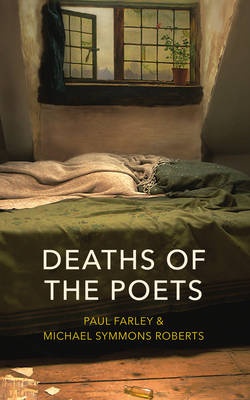 From Chatterton’s Pre-Raphaelite demise to Keats’ death warrant in a smudge of arterial blood; from Dylan Thomas’s eighteen straight whiskies to Sylvia Plath’s desperate suicide in the gas oven of her Primrose Hill kitchen or John Berryman’s leap from a bridge onto the frozen Mississippi, the deaths of poets have often cast a backward shadow on their work.
From Chatterton’s Pre-Raphaelite demise to Keats’ death warrant in a smudge of arterial blood; from Dylan Thomas’s eighteen straight whiskies to Sylvia Plath’s desperate suicide in the gas oven of her Primrose Hill kitchen or John Berryman’s leap from a bridge onto the frozen Mississippi, the deaths of poets have often cast a backward shadow on their work.
The post-Romantic myth of the dissolute drunken poet – exemplified by Thomas and made iconic by his death in New York – has fatally skewed the image of poets in our culture. Novelists can be stable, savvy, politically adept and in control, but poets should be melancholic, doomed and self-destructive. Is this just a myth, or is there some essential truth behind it: that great poems only come when a poet’s life is pushed right to an emotional knife-edge of acceptability, safety, security? What is the price of poetry? In this book, two contemporary poets undertake a series of journeys – across Britain, America and Europe – to the death places of poets of the past, in part as pilgrims, honouring inspirational writers, but also as investigators, interrogating the myth. The result is a book that is, in turn, enlightening and provocative, eye-wateringly funny and powerfully moving.
Michael Symmons Roberts‘s sixth collection of poetry, Drysalter, was the winner of both the Forward Prize and the Costa Poetry Prize in 2013. He has published two novels, and is Professor of Poetry at Manchester Metropolitan University.
Paul Farley is the author of four collections of poetry and has won the Forward Prize for Best First Collection, the Whitbread Poetry Award and the E. M. Forster Award.
Edgelands, co-written with Michael Symmons Roberts, received the Royal Society of Literature’s Jerwood Award and the 2011 Foyles Best Book of Ideas Award and was serialised as Radio 4 Book of the Week.
The Deaths of the Poets
Michael Symmons Roberts & Paul Farley
ISBN : 9780224097543
Hardback, 400 pages
February 2017
Publisher: Random House Children’s Publishers UK
fleursdumal.nl magazine
More in: - Archive Tombeau de la jeunesse, - Book News, Art & Literature News, DEAD POETS CORNER, Galerie des Morts, POETRY ARCHIVE, Sylvia Plath
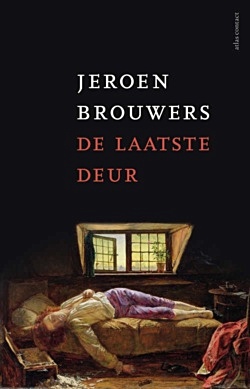 De laatste deur (nieuwe herziene en zeer uitgebreide editie)
De laatste deur (nieuwe herziene en zeer uitgebreide editie)
door Jeroen Brouwers
Liefde-literatuur-dood is de thematische drie-eenheid binnen het oeuvre van Jeroen Brouwers. Zijn fascinatie voor zelfmoord dateert van het begin van de jaren zeventig, toen een vriendin zich het leven had benomen. Brouwers’ wens om het zelfmoordraadsel te begrijpen resulteerde in het inmiddels legendarische boek De laatste deur.
Dit is de ingrijpend herziene en zeer uitgebreide editie van het dertig jaar geleden verschenen werk, dat handelt over de zelfverkozen dood van Nederlandstalige schrijvers. Vanuit gevoelens van mededogen, begrip en solidariteit met hen die in het verleden en de meer recente tijd de hand aan zichzelf sloegen (van wie hij er enkelen van zeer nabij heeft gekend), poogt Brouwers aan de hand van hun literaire werk een mogelijke verklaring te vinden voor hun ultieme daad.
Brouwers karakteriseert op integere en invoelende wijze uiteenlopende figuren als François Haverschmidt (Piet Paaltjens), Menno ter Braak, Halbo Kool, Jan Emmens, Jan Arends, Dirk de Witte, Jan Emiel Daele, Jotie T’Hooft en tal van anderen. Deze nieuwe editie bevat ook levensgeschiedenissen van overledenen in de laatste jaren: Adriaan Venema, Anil Ramdas, Nanne Tepper, Joost Zwagerman en Wim Brands.
Aan De laatste deur is een supplement toegevoegd (De zwarte zon, De versierde dood en verspreide opstellen) met essays over buitenlandse schrijvers en onderwerpen als zelfmoordverenigingen en –sekten, en geruchten en verzinsels over zelfmoord. Een aantal van deze opstellen is niet eerder in boekvorm verschenen.
Auteur(s) : Jeroen Brouwers
Uitgeverij : Atlas Contact
ISBN : 9789045021089
Taal : Nederlands
Uitvoering : Hardcover
Aantal pagina’s : 1400
Verschijningsdatum : 15-03-2017
Afmetingen : 314 x 254 x 27 mm.
Gewicht : 700 gr.
fleursdumal.nl magazine
More in: - Archive Tombeau de la jeunesse, - Book News, Art & Literature News, Babylon, Frans, Brands, Wim, DRUGS & DISEASE & MEDICINE & LITERATURE, Galerie des Morts, Jeroen Brouwers, Zwagerman, Joost
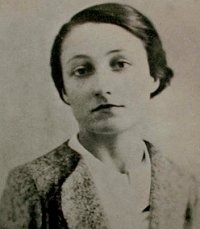
Laure
(Colette Peignot 1903 – 1938))
D’où viens-tu ?
D’où viens-tu avec ton cœur
déchiré aux ronces du chemin.
Les mains calleuses de casseur de pierre
et ta tête gonflée comme une
outre piquée ?
Nous sommes ceux qui crient dans le désert
qui hurlent à la lune.
Je le sens bien maintenant : « mon devoir m’est remis. » Mais
lequel exactement ?
C’est parfois si lourd et si dur que je voudrais courir dans la
Campagne.
Nager dans la rivière
oublier tout ce qui fut, oublier l’enfance sordide et timorée.
Le vendredi saint, le mercredi des cendres.
l’enfance toute endeuillée à odeur de crêpe et de naphtaline
L’adolescence hâve et tourmentée.
Les mains d’anémiée.
Oublier le sublime et l’infâme
Les gestes hiératiques
Les grimaces démoniaques.
Oublier
Tout élan falsifié
Tout espoir étouffé
Ce goût de cendre
Oublier qu’à vouloir tout
on ne peut rien
Vivre enfin
« Ni tourmentante
Ni tourmentée »
Remonter le cours des fleuves
Retrouver les sources des montagnes
les femmes les vrais hommes travailleurs
qui enfantent
moissonnant
M’étendre dans les prairies
Quitter ce climat
Ses dunes, ses landes sablonneuses, cette grisaille et
ses déserts artificiels,
Ce désespoir dont on fait vertu,
Ce désespoir qui se boit
se sirote à la terrasse des cafés
s’édite… et ne demanderait qu’à nourrir très bien son homme
Vivre enfin
Sans s’accuser
ni se justifier
Victime
ou coupable
comment dire ?
Un tremblement de terre m’a dévastée
On t’a mordu l’âme
Enfant !
Et ces cris et ces plaintes
Et cette faiblesse native
Oui –
Et s’ils ont vu mes larmes
Que ma tête s’enfonce
jusqu’à toucher
le bois
et la terre
LAURE (Colette Peignot) poetry
fleursdumal.nl magazine
More in: - Archive Tombeau de la jeunesse, Archive K-L, Laure (Colette Peignot)
 On 24th January 2015 Shaimaa el-Sabbagh, a poet and a member of the Socialist Popular Alliance Party, was marching to commemorate the hundreds of demonstrators that were killed during the Arab Spring uprising of 2011.
On 24th January 2015 Shaimaa el-Sabbagh, a poet and a member of the Socialist Popular Alliance Party, was marching to commemorate the hundreds of demonstrators that were killed during the Arab Spring uprising of 2011.
Shaimaa el-Sabbagh was shot in the back by riot police officers, while heading to Tahrir Square in Cairo to lay flowers there.
The Alliance Party said in a statement, that their only intention was to place flowers for of the fourth anniversary of the Jan. 25 revolution. Other demonstrators were also injured in the same demonstration.
Egyptian Government officials denied that the police had fired any shots.
At Sunday the funeral of the 31-year-old mother and poet, held in Alexandria, was attended by nearly 10,000 people.
 I am the girl banned from love in the squares …
I am the girl banned from love in the squares …
I stood in the middle of the street
and gathered in my hand the stars of the sky individually
And the sweat of the street vendors.
The voice of beggars
And the people who love God
as they damn this moment where the creatures of God approved
To crucifying Jesus naked in the crowded square
on the clock arms as it declared one at noon
I am the girl banned from saying no,
will never miss the dawn
Shaimaa al-Sabbagh
(From the poem: I’m the girl banned from attending the Christian religion classes, and Sunday mass. Translation by Maged Zaher)
# See Twitter Account Shaimaa el-Sabbagh
# Poems (in English) of Shaimaa el-Sabbagh on website: TIN HOUSE
fleursdumal.nl magazine
More in: - Archive Tombeau de la jeunesse, In Memoriam, REPRESSION OF WRITERS, JOURNALISTS & ARTISTS
Thank you for reading Fleurs du Mal - magazine for art & literature